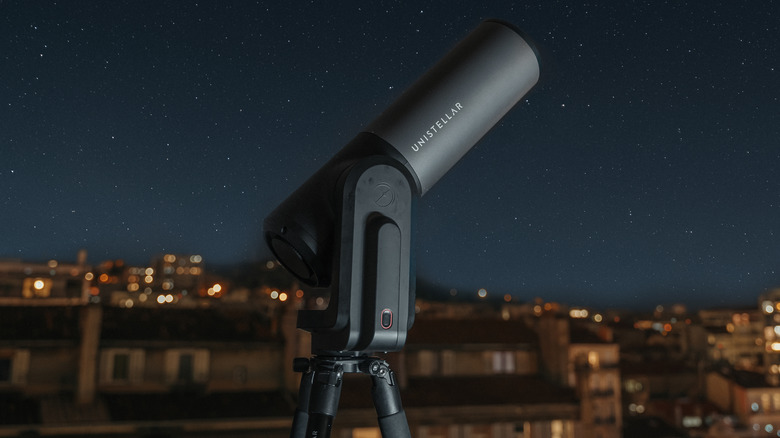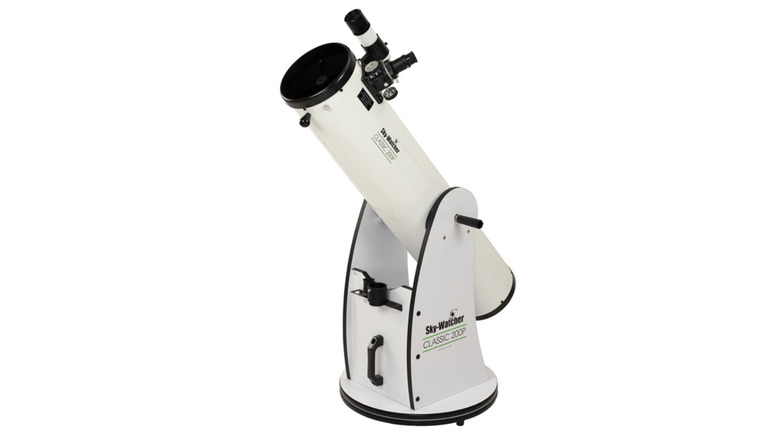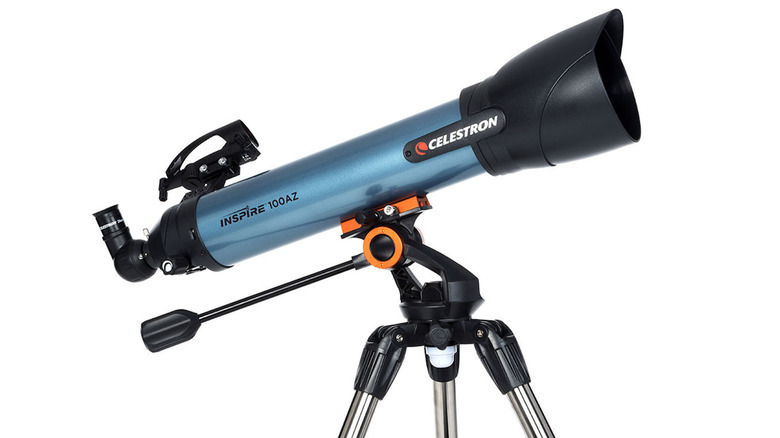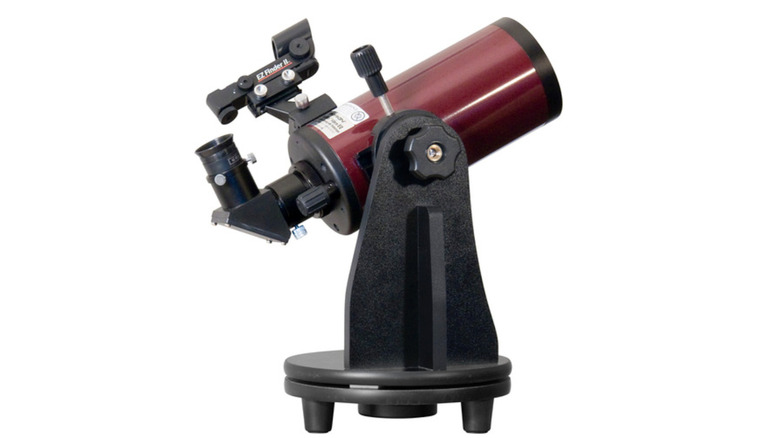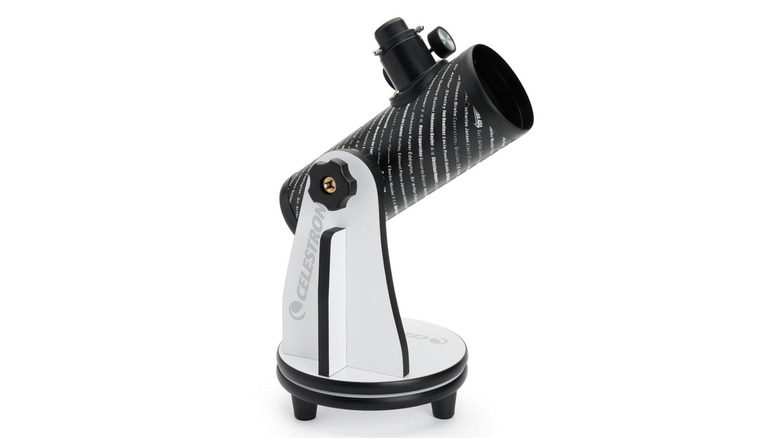The 5 Best Telescopes For Beginners, Ranked By Price
If you've ever caught yourself staring up at the night sky and wishing you could take a closer look, you might have considered buying a telescope. However, with such a wide range of options available — and the fact that even amateur astronomy can seem like a daunting hobby to break into at the start — searching for the right telescope can be intimidating.
There are many factors to consider when selecting the right telescope, depending on where you plan to use it, what you plan to gaze at, and whether or not you'll be using it to take photographs. There are also telescopes that are better suited for beginners than others. To make things even more confusing, the cheapest, most basic telescopes aren't always the best ones if you're just starting out, and starting out with an inferior telescope could lead to an unsatisfying experience that ultimately turns you off astronomy before you've even give it a chance. To make sure that doesn't happen, here are the five best telescopes for beginners, ranked by price.
Unistellar eQuinox 2
The Unistellar eQuinox 2 is a great telescope for anyone, but is uniquely suited for many younger, beginner astronomers who grew up doing everything on their smartphones. That's because it's a smart telescope, controlled with just one button and a smartphone app it must be paired with. By using an interface that many people — especially younger generations — are already familiar with, it's perfect as a starter telescope. However, this can also be considered one of its biggest downsides if you're looking for a more traditional experience.
The other concern is its astronomical price (no pun intended). The Unistellar eQuinox 2 costs $2,499, though luckily it can be paid off in installments. Telescopes, especially good ones, can be pretty expensive, and this isn't an unreasonable price per se. But if you're just starting out and not ready to make a big investment in case it turns out astronomy isn't for you, you'll want to aim for a cheaper option.
The Unistellar eQuinox 2 can justify its high cost, though. Besides an included tripod and the innovative smartphone controls, the telescope has a Smart Light Pollution Reduction feature that makes it easier to see celestial objects from densely-populated urban areas with lots of artificial light. It also has a 4.5-inch (114 mm) aperture, 450 mm focal length, and a 50x optical/150x digital magnification range, allowing you to see far and wide.
Sky-Watcher Classic Dobsonian 8
A Dobsonian telescope is also known as a "light bucket," because it works to capture as much ambient light as possible in order to see deeper into the cosmos. That's partly what makes the Sky-Watcher Classic Dobsonian 8" telescope great for beginners — once it's set up, you can see images that will have you hooked on astronomy. The eight inches in the name refer to the size of its mirror, which, when combined with its 1200 mm focal length and 203 mm optical diameter, gives amateur skywatchers the ability to stargaze at 406x magnification.
Another reason why a Dobsonian telescope is a good choice for beginners is its relative simplicity, making it easy to set up and use. The Sky-Watcher also uses a patented Control Handle to keep the optical tube stabilized and in position, in case you're worried about losing an image once you have it perfectly focused and in view.
However, the large size of the Dobsonian telescope makes it a lot less portable than other beginner telescopes. It's not ideal for taking it with you if you're camping or going somewhere with darker skies and a better view. But if you plan on keeping it in a stationary location in your yard, for example, then it's a solid choice. The Sky-Watcher Classic Dobsonian 8" has a list price of $820, but it's currently savailable from Amazon at $655.
Celestron Inspire 100AZ
The Celestron Inspire 100AZ is a refractor telescope that is lightweight and has a simple setup not requiring any tools, making it a great option for beginners. It's also easy to break down and put away if you're not leaving it out all the time. It comes with two Kellner eyepieces (10 mm and 20 mm), and its 100 mm lens makes it great for gazing at Saturn's rings and for detailed looks at Earth's moon.
The telescope also has some useful features, including a lens cap that serves as smartphone holder, an adjustable-height tripod with an attached accessory tray, a smooth panning handle, an integrated LED flashlight, and a StarPointer Pro finderscope to help you easily locate celestial objects in the sky you'd like to get a better look at.
The Celestron Inspire 100AZ is also relatively affordable for a good telescope, priced at $349. You can find one at multiple retailers, including Amazon, as well as Home Depot. Unfortunately, like many other telescopes in its price range, its image quality isn't always perfect. You can expect some false color occasionally, and the default eyepieces it comes with may lead to some blurry images. But what you see will still be pretty impressive, and if you find yourself wanting even better looks at the stars, you can always upgrade to more intermediate or advanced telescopes later on.
Orion StarMax 90 mm
The Orion StarMax 90 mm is a relatively cheap telescope, is ideal for beginners because it doesn't cost much and has an easy set up that won't turn off entry-level astronomers. It's a reflector telescope with a five-inch (127 mm) aperture and 1,000 mm focal length, which makes it capable of 300x magnification. Its lowest useful magnification is 18x. That's enough to see objects far beyond the Moon if you've got optimal viewing conditions.
However, there really isn't a reason to pick up this telescope if you're not a beginner, because it's inferior to pricier options in multiple ways. It doesn't come with any innovative features, and some of its components are made of cheap plastic to the telescope's detriment. Plus, its 20 mm and 4 mm eyepieces leave much to be desired when it comes to optics. However, this telescope works better than most in its price range, and its low-cost is exactly what can attract beginners to astronomy. Once they've had a taste of all they can do with a telescope, they'll be more inclined to spend money on superior options. The Orion StarMax 90 mm is available for $279 from Amazon.
Celestron 76mm Classic FirstScope
If you don't want to spend more than $100 for a telescope, you can't expect to find the best — but the Celestron 76mm Classic FirstScope is a good option for beginner astronomers, especially children who've just picked up the interest. It's easy to use, durable, lightweight, and portable — so you'll be able to take it to different places looking for ideal viewing locations. While there are binoculars that have stronger viewing magnification, the traditional look and feel of this Newtonian telescope feels more like traditional astronomy, which can be very important for beginners dipping a toe into the scientific hobby.
Keep in mind that it doesn't have a tripod and is meant to be placed on a table or other surface when used. The FirstScope has a 76 mm aperture and 300 mm focal length, and comes with two eyepieces (15x and 75x). It shouldn't be a surprise that a telescope this cheap won't have perfect optics, with sacrifices to clarity and detail coming with its low cost. However, if you're buying a telescope for a child who may end up losing interest in astronomy just a few weeks later, the FirstScope's affordable price is a huge asset — especially since it's still a decent telescope. The Celestron 76mm Classic FirstScope is available from Amazon for $71.95.

